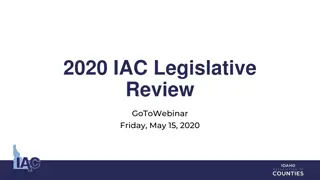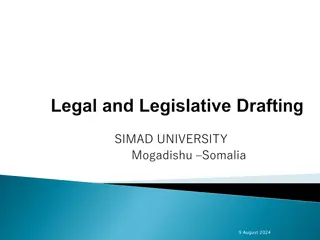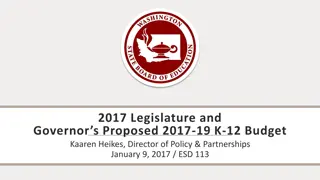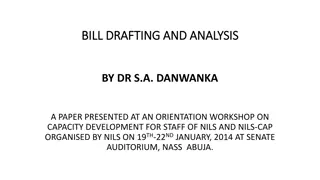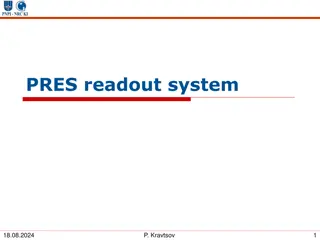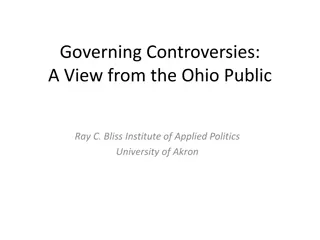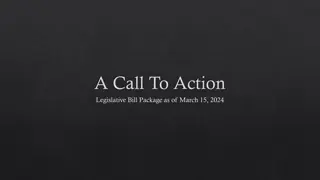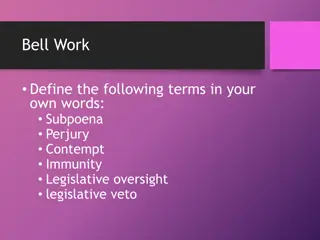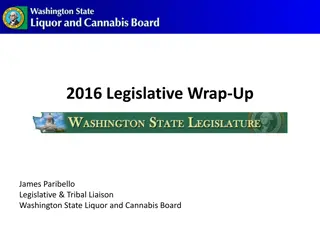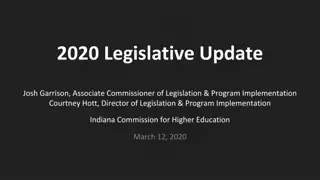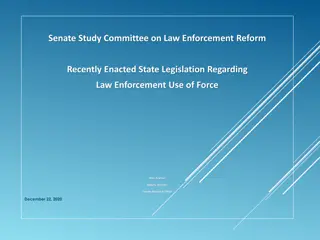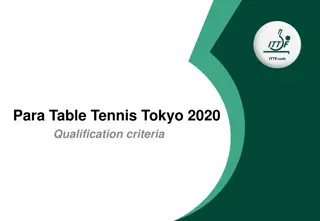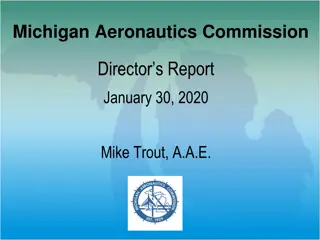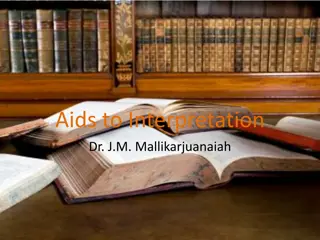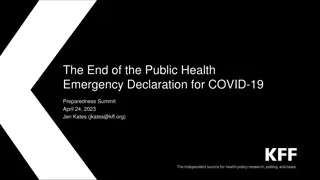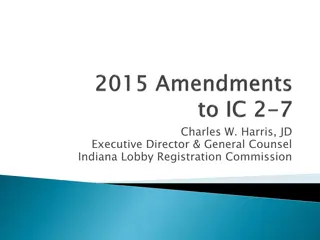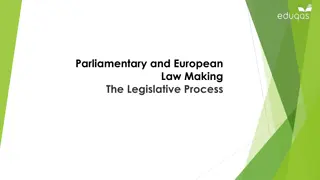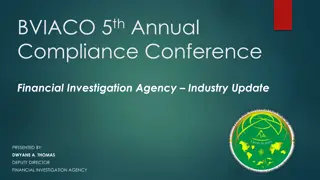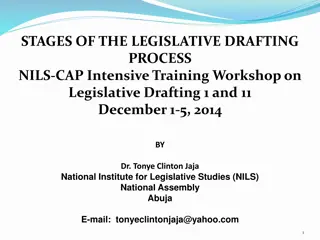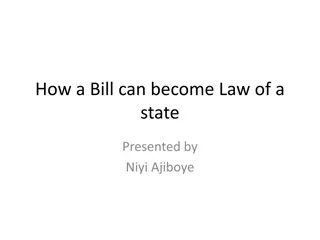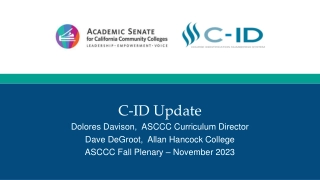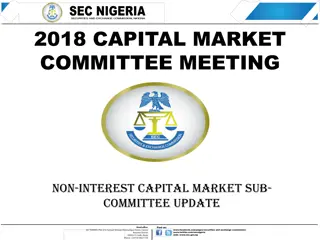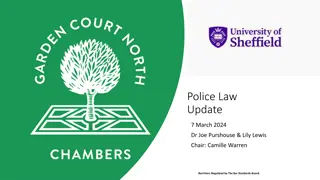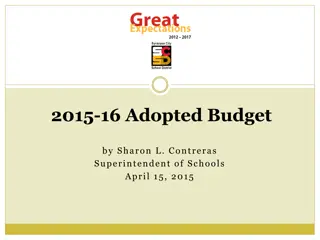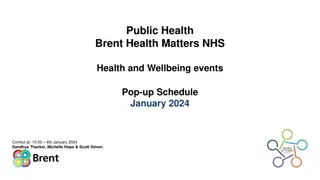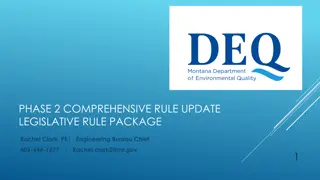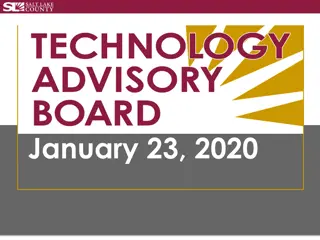EU Legislative Developments and Events Tracker - January 2020 Highlights
This month, key events include discussions on the EU industrial strategy, postponed presentations on the EU Climate Law and Circular Economy Action Plan, adoption of the EU Industrial Strategy by March 2020, and more. Legislative proposals for common chargers, sustainable chemicals strategy, batteries, and circular economy are on the agenda for 2020. The European Parliament passed resolutions on the Green Deal and common chargers for mobile devices. Upcoming events focus on renewable energy, low-carbon mobility, and financing the transition to a low-carbon economy.
Download Presentation

Please find below an Image/Link to download the presentation.
The content on the website is provided AS IS for your information and personal use only. It may not be sold, licensed, or shared on other websites without obtaining consent from the author. Download presentation by click this link. If you encounter any issues during the download, it is possible that the publisher has removed the file from their server.
E N D
Presentation Transcript
RECHARGE Legislative Tracker January 2020 Highlights this month Forthcoming developments 04 March 2020: College of Commissioners shall have a discussion on an EU industrial strategy. 10 Mar 2020: postponed presentation of the EU Climate Law and postponed College of Commissioners discussion on the Circular Economy Action Plan. By March 2020: EC to adopt an EU Industrial Strategy Q1 2020: Commission to withdraw proposal on reducing pollutant emissions from road vehicles (Euro 5 and 6) Public consultation on the evaluation of AFID to be launched Commission to finalise evaluation of the IED Q3 2020:Legislative proposal for Common chargers for mobile phones and similar devices Summer 2020: Commission to present Chemicals strategy for sustainability, according to the Green Deal Communication. By October 2020: Adoption of legislative measures for batteries in support of the Strategic Action Plan on Batteries and Circular Economy The Commission published its 2020 Work Programme A draft version of the Circular Economy Action Plan II leaked The 1 trillion Sustainable investment plan, which will include a just transition fund worth 100 billion was presented. The EP voted a joint motion for resolution on the Green Deal, calling for a circular and sustainable battery value chain for all batteries. The Foreign Affairs Council adopted Council Conclusions on Climate diplomacy. 28 Jan 2020: the European Parliament s voted to adopt a resolution urging the Commission to propose binding rules on common chargers for mobile devices by the summer. Upcoming events o o o 10 Feb 2020: Webinar: Renewable energy on islands: electricity storage and integration challenges 12 Feb 2020: Encouraging and Rewarding Sustainability 13 Feb 2020: Low Carbon Mobility: Making Modal Shift Desirable Financing the Transition to a Low-Carbon Economy and the Challenges in Financing Climate Change Adaptation 19 Feb 2020 Getting zero-emission trucks on the road 03 Mar 2020: Forum Europe s 2020 Future of Transport Conference 17 Mar 2020: Just Transition Fund: The Enabler For A Successful Climate Transition? 28-30 April 2020: The Battery Show o o
RECHARGE Legislative Tracker January 2020 Monitoring Index Batteries & EBA EBA and Battery Action Plan Environmental Legislation REACH RoHS Ecolabels & EMAS Ecodesign Mobility, Energy & Climate Automotive & Emissions Alternative Fuels Infrastructure End-of-life Vehicles 2050 Long Term Strategy Waste & Circular Economy CE & Product Policy Framework Waste Framework Directive Battery Directive End-of-waste criteria for batteries WEEE List of Hazardous Waste (LoW) Waste Shipment Regulation Extended Producer Responsibility Materials legislation Raw Materials Product Environmental Footprint Research Horizon 2020 / Horizon Europe Safety Directive on Product Safety Requirements
European Battery Alliance & Battery Action Plan
RECHARGE Legislative Tracker European Battery Alliance & Battery Action Plan Relevance Key Stakeholders Commissioners Environment: Virginijus Sinkevi ius Interinstitutional Relations and Foresight: Maro ef ovi Transport: Adina-Ioana V lean Industry and Internal Market: Thierry Breton EP Committee Chairs ENVI : Pascal Canfin (FR, Renew Europe) ITRE : Cristian-Silviu Bu oi (RO, EPP) TRAN: Karima Delli (FR, Greens) The European Battery Alliance was launched in October 2017 as a cooperative platform gathering; the European Commission; interested EU countries; the European Investment Bank; key industrial stakeholders; innovation actors. The immediate objective is to create a competitive manufacturing value chain in Europe with sustainable battery cells at its core. In support of this objective, the Battery Action Plan was launched in 2018. Presidency: Croatia Next steps History 9 Apr 2019: Commission released Report on the Implementation of the Battery Action Plan and Annex 9 Aug 2019: Public consultation on EU requirements for sustainable batteries closed. 30 Sep 2019: Competitiveness Council meeting - +/- 12.10. (agenda) 21 Nov 2019: Commissioner Maro ef ovi has held a speech at the BATTERY 2030+ conference in which he lays out that the Commission will take action to secure sustainable access to raw materials. 01 Dec 2019: Maro ef ovi to coordinate the Commission s work on the EBA 11 Dec 2019: In its Green Deal communication, the EC indicates that it will continue supporting the EBA & implementing the Strategic Action Plan on Batteries. The same day, the EC approves 3.2 billion public support by 7 Member States for a pan-European research and innovation project in all segments of the battery value chain (press release) By March 2020: EC to adopt an EU Industrial Strategy 28 May 2020: the Competitiveness Council will discuss the reorganisation of the EU s industrial strategy, with a particular focus on batteries By October 2020: Adoption of legislative measures for batteries in support of the Strategic Action Plan on Batteries and Circular Economy 2022: first battery plant to be opened in France as part of the European Battery Alliance To Index To Index
Circular Economy & Waste Legislation
Circular Economy & Product Policy Framework RECHARGE Legislative Tracker Relevance Key Stakeholders In 2015 a Circular Economy Package was published. It is composed of a Communication the "Action Plan", composed of new legislative proposals (such as a market for secondary raw materials), and legislative proposals amending six Directives: Directive 2008/98/EC on waste, Directive 94/62/EC on packaging and packaging waste, Directive 1999/31/EC on the landfill of waste, Directive 2000/53/EC on end-of-life vehicles, Directive 2006/66/EC on batteries and accumulators and waste batteries and accumulators and Directive 2012/19/EU on waste electrical and electronic equipment. More recently, the Commission announced a Circular Economy Action Plan II. Commissioners Environment: Virginijus Sinkevi ius EP Committee Chairs ENVI : Pascal Canfin (FR, Renew Europe) Presidency: Croatia Ana Kova evi , First Secretary (Environment, Waste, Chemicals, Air Quality) Rapporteur of the Circular Economy Package: Simona Bonaf , Italy, S&D History Next steps 29 Nov 2019: The leaked first draft of the new environmental laws part of a European Green Deal announces the adoption of an EU instrument establishing sustainability criteria for batteries in the circular economy. 11 Dec 2019: The Communication presenting the Green Deal outlined that the Commission is expected to present a "chemicals strategy for sustainability" aimed at delivering the zero pollution ambition. 21 Jan 2020: deadline of the public consultation on the Commission's Roadmap on the expected Circular Economy Action Plan. 31 Jan 2020: a version of the Circular Economy Action Plan II leaked. 04 March 2020: College of Commissioners discussion on an EU industrial strategy. 10 March 2020: College of Commissioners discussion on a circular economy action plan II. By end March 2020: Commission to come forward with a Circular Economy Package 2.0., including a sustainable products initiative. Summer 2020: Commission to present Chemicals strategy for sustainability, according to the Green Deal Communication. Future developments (without date, according to leaked Circular Economy Action Plan II): development of a basis for an electronic product passport. To Index To Index
RECHARGE Legislative Tracker Waste Framework Directive Relevance Main Stakeholders Waste Framework Directive (WFD) forms the legal framework for the treatment of waste within the EU. It aims to protect the environment and people from through the prevention of the harmful effects of waste generation and waste management. It specifies waste management principles and covers the recycling of battery waste, among others the end-of-waste criteria, which specify when certain waste streams cease to be waste and obtain a product status. EP Committee Chairs ENVI : Pascal Canfin (FR, Renew Europe) Commissioners Environment: Virginijus Sinkevi ius Presidency: Croatia History Next steps 27 Feb 2018: Provisional agreement on Circular Economy files (incl. WFD and BD) approved by COREPER and ENVI committee. 16 Apr 2018: EP debate on Circular Economy package. 18 Apr 2018: EP Plenary vote on compromise agreement on WFD. 22 May 2018: Council approved the compromise agreement on WFD. 14 June 2018: The Directive was published in the EU Official Journal. 4 Jul 2018: The directive entered into force. 24 Sep 2018: Report on recycling targets, equivalents conditions, Member State reporting. 20 Jun 2019: Publication of the Commission Implementing Decision laying down rules for the calculation, verification and reporting of data on waste. 2020 (delayed from Q1 2019): The adoption of the expected delegated act establishing rules for the calculation, verification and reporting of the weight of materials which are removed after a sorting operation and which are not subsequently recycled has been postponed. By Oct 2022: the Commission is expected to present a report on the exercise of the power to adopt delegated acts under WFD. By the end of 2024: Commission expected to present a Report reviewing the EU waste prevention measures of the WFD. Commission expected to present a Report on the feasibility of setting preparing for re-use and recycling targets on certain waste streams. To Index To Index
RECHARGE Legislative Tracker Batteries Directive Relevance The Batteries Directive (Directive 2006/66/EC), the only piece of EU legislation entirely dedicated to batteries, was published in 2006. It established the Extended Producer Responsibility (EPR) on batteries and sets requirements on the collection, treatment, and recycling of used batteries and accumulators placed on the EU market. The Commission has completed the evaluation of the Batteries Directive and published its results in April 2019 which is likely going to lead to its revision. EP Committee Chairs ENVI : Pascal Canfin (FR, Renew Europe) Commissioners Environment: Virginijus Sinkevi ius Presidency: Croatia History Next steps 09 Apr 2019: Report on the evaluation of the battery directive was released. 11 Jul 2019: Discussion within the Council on the Commission s evaluation of EU rules on waste batteries started. 11 Dec 2019: In its Green Deal Communication, the Commission stated that it will present legislation in support of the Strategic Action plan on Batteries in October 2020, possibly through a revision of the Batteries Directive. October 2020: the Commission shall present legislation in support of the Strategic Action plan on Batteries. This support could possibly take the form of a revision of the Batteries Directive. The initiative will modify the Directive or a proposal for a new Regulation repealing the Directive will be prepared, to notably encompass end-of-life and sustainability requirements. To Index To Index
RECHARGE Legislative Tracker End-of-waste criteria for batteries Relevance Main Stakeholders End-of-waste criteria, lay down in the Waste Framework Directive, specify when certain waste ceases to be waste and obtains a status of a product. In the batteries life-cycle those criteria would apply to the recycling stage. However, those criteria exist currently for certain products but batteries are not within the scope yet. EP Committee Chairs ENVI : Pascal Canfin (FR, Renew Europe) Commissioners Environment: Virginijus Sinkevi ius Presidency: Croatia History Next steps Communication on the implementation of the Circular Economy Throughout 2020: (based on Commission s announcements in the framework of discussions on Interface between waste and chemicals): Study on Member States and verification of end-of-waste provisions.The longer-term aspiration is to achieve full coherence between the laws implementing waste and chemicals policies. 2018: Package: options to adress the interface between chemical, product and waste legislation. 4 options are considered to adress the interface, one of them is the harmonization of end-of-waste criteria. Therefore, a study will be conducted on Member States' implementation of end-of-waste. practices on the implementation To Index To Index
RECHARGE Legislative Tracker WEEE Relevance Key Stakeholders Directive 2012/19/EU regulates waste from EEE throughout the EU. It sets out: (1) New collection targets for Member States 7 years after the entry into force of the Directive and an intermediate target 4 years after entry into force; (2) Take- back of small WEEE at large retail shops unless alternative schemes can be shown to be at least as effective; (3) Widening the scope of the Directive to include all EEE 6 years after the entry into force of the Directive with additional exemptions & after an EC review; (4) The harmonisation of registration & reporting requirements, (national law) to allow for better enforcement; (5) The introduction of minimum requirements for shipments of used equipment suspected of being illegal waste shipments, including the reversal of the burden of proof subject to certain derogations. EP Committee Chairs ENVI : Pascal Canfin (FR, Renew Europe) Commissioners Environment: Virginijus Sinkevi ius Presidency: Croatia Next steps History 14 Jun 2018: The Directive revising reporting requirements was published in the EU Official Journal. 4 Jul 2018: The directive entered into force. 24 Jan 2019: The Commission has awarded the service contract in support of the development of a draft measure setting European standards for the treatment of waste from WEEE. 20 Feb 2019: Commission implementing information and reporting of WEEE was published in the EU official Journal. 5 Mar 2019: the implementing regulation entered into force and it will apply from 1 January 2020. (delayed): external contract will carry out a study supporting 2020 the preparation of a possible implementing act laying down minimum quality standards for the treatment of WEEE. The study will feed results to the Commission should it start drafting the measure. regulation on registration, To Index To Index
RECHARGE Legislative Tracker Extended Producer Responsibility Relevance Main Stakeholders Commissioners Environment: Virginijus Sinkevi ius EP Committee Chairs ENVI : Pascal Canfin (FR, Renew Europe) Extended Producer Responsibility Regulations obligate producers of batteries and of products incorporating batteries to be responsible for the management of the waste generated by the batteries they place on the market. Presidency: Croatia History Next steps 4 July 2018: the reviseed WFD entered into force. Mar 2019: commission has launched two projects: A study to extended Producer responsibility schemes A study on packaging and packaging waste and proposal for reinforcement 16 Oct 2019: Eunomia hold stakeholder workshop that will feed into the study to support the development of the Responsibility Schemes and will focus on WEEE and Batteries By 5 Jul 2020: Member States will have to transpose the revised WFD and the Packaging and Packaging Waste Directive. By 31 Dec 2024: Member States have to establish EPR schemes for all packaging. preparation of the guidance for commission s effectiveness of the essential requirements for Guidance for Extended Producer To Index To Index
RECHARGE Legislative Tracker Waste Shipment Regulation Relevance Main Stakeholders Waste Shipment Regulation (EC) No 1013/2006 aims to ensure the protection of the environment when waste is subject to shipment. It, therefore, establishes procedures and control regimes for the shipment of waste, depending on the origin, destination and route of the shipment, the type of waste shipped and the type of treatment to be applied to the waste at its destination. Shipments of waste batteries must be in accordance with waste shipment regulations. Commissioners Environment: Virginijus Sinkevi ius EP Committee Chairs ENVI : Pascal Canfin (FR, Renew Europe) Presidency: Croatia History Next steps 24 Jan 2019: The Commission has awarded the service contract for an external study in support of the development of a delegated act setting out criteria for the assessment of equivalent conditions concerning the treatment of WEEE in non- EU facilities. 27 Apr: commission public consultation on the evaluation of EU rules on shipment of waste has closed. First half 2019: the Commission will issue its own formal report on WSR, in the form of the Staff Working Document. Aug 2019: the Commission presented a report on the implementation of the WSR during the period 2013-2015. 24 Jan 2020: Launch of impact assessment on WSR to explore options for the improvement of the Regulation or its implementation 31 Jan 2020: Comission adopted the Staff Working Document (SWD) containing the evaluation of the WSR. 2020 (delayed): The Commission is expected to adopt a draft measure on an electronic data interchange system for the registration of waste shipments. The draft measure would be based on the results of a preparatory study carried out by an external consultant (Abaroa consortium). The Commission's work on the development of the draft measure is still ongoing. Early 2020: expected publication of the WSR Report. Spring 2020: a stakeholder consultation is expected to be launched to gather stakeholders' views on WSR. 2021: according to the leaked Circular Economy Action Plan, a proposal to revise the Waste Shipment Regulation is expected. To Index To Index
RECHARGE Legislative Tracker List of Hazardous Waste Relevance Main Stakeholders The European List of Waste (Commission Decision 2000/532/EC) is meant to be a reference nomenclature providing a common terminology throughout the Union with the purpose to improve the efficiency of waste management activities. The List of Waste (LoW) serves as a common encoding of waste characteristics in a broad variety of purposes like classification of hazardous wastes. To determine which waste is hazardous, the LoW uses Annex III to the WFD which indicates the properties of hazardous waste. Several types of waste batteries are currently classified as hazardous waste. Commissioners Environment: Virginijus Sinkevi ius EP Committee Chairs ENVI : Pascal Canfin (FR, Renew Europe) Presidency: Croatia History Next steps 9 Apr 2018: Publication of Commission non-binding guidance document which provides clarifications and guidance to national authorities, including local authorities, and businesses (e. g. for permitting issues) on the correct interpretation and application of the relevant EU legislation regarding the classification of waste, namely identification, assessment of hazardous properties, and, ultimately, classifying the waste as hazardous or non-hazardous. It is based on the results of a preparatory study carried out by an external consultant (BiPRO GmbH). Guidance document to be adopted with several other acts. End of 2019: the Commission has indicated that it may present a draft measure amending the European List of Waste for batteries and accumulators once the evaluation of the Batteries Directive is completed. 2020 (delayed from Q4 2019) : Now that the evaluation of the Batteries Directive is completed, the Commission indicated that it may present a draft measure amending the European List of Waste (ELW) for batteries and accumulators.
Other Environmental Legislation
RECHARGE Legislative Tracker Ecodesign Relevance Key Stakeholders ytdhthgfd Commissioners Industry and Internal Market: Thierry Breton Environment: Virginijus Sinkevi ius Presidency: Croatia The Ecodesign Directive (Directive 2009/125/EC) lays down rules for improving the environmental performance of energy-consuming products household appliances) by setting out minimum mandatory requirements for the energy efficiency of these products. The Commission considered expanding the scope of this directive to batteries through an Initiative on Sustainability Requirements for Batteries. EP Committee Chairs ENVI : Pascal Canfin (FR, Renew Europe) ITRE : Cristian-Silviu Bu oi (RO, EPP) (such as History Next steps 2020 (delayed): Completion of preparatory study evaluating the feasibility of setting ecodesign requirements for solar panels and inverters is being carried out by the JRC, (launched in 10/2017). It consists of the following tasks: Scope (Task 1), Market Analysis (Task 2), User Analysis (Task 3), Technologies (Task 4), Environment and Economics (Task 5), Design Options (Task 6) and Policy Scenarios (Task 7). In addition, sub-tasks would be carried out in support of the analysis of the potential for an EU Ecolabel and Green Public Procurement criteria for the product group. These would include analysis of environmental and other issues (e.g. health performance, CSR) and the improvement potential of using these voluntary instruments. Q1/2 2020: completion of complementary study on Task Report 7. It will feed into the Commission s decision on whether to present a draft measure. As of 2020: ecodesign measures on common chargers. Q2 2020: Awaited confirmation that ecodesign requirements for rather looks into alternative actions. Appliances in scope and not under either Energy Labelling or Ecodesign regulation are home batteries and electric vehicle chargers. complementary study to the Task Report 7 has 24 been launched to address some of the identified gaps. 24 Oct 2019: final report energy labelling of was published (with annex). 25 Oct 2019: new ecodesign requirements for electric motors and variable speed drives published. Beg 2019 (delayed): Review of ecodesign requirements for standby and off mode electric power consumption, publication of the IA. 5 Nov 2019: 3rd Stakeholder meeting on the complementary study on Task Report 7 (minutes and presentations can be found here). 14 Nov 2019: new ecodesign requirements for electric motors and variable speed drives under Regulation (EU) 2019/1784 enters into force. 19 Nov 2019: deadline for comments the complementary study to the Task Report 7. 27 Nov 2019: publication of material 'General methods for assessing the recyclability and recoverability of energy- related products.' Oct 2019: of rechargeable a preparatory study electrochemical on ecodesign and batteries the Commission smart won't establish on the discussion notes for appliances and efficiency standard EN 45555 To Index To Index
RECHARGE Legislative Tracker REACH Legislation Relevance Key Stakeholders The Chemicals) Regulation (EC) No 1907/2006, which entered into force in 2007, puts a procedure in place for the collection and assessment of information on the properties and hazards of chemical substances and as such, places obligations on the Battery industry, among others, for registering and declaring substances of very high concern used in batteries. REACH (Registration, Evaluation, Authorisation and Restriction of Commissioners Environment: Virginijus Sinkevi ius EP Committee Chairs ENVI : Pascal Canfin (FR, Renew Europe) Presidency: Croatia History Next steps Commission published report on Fitness check 2020 (delayed): Publication of ko-Institut study on development of indicators on the positive effects of EU chemicals regulation. Early 2020: Commission to publish feasibility study on the possibility to provide information on the presence of substances of concern to recyclers and other players handling waste. 12 February: The plenary MEPs are scheduled to vote on the Motion for a Resolution objecting to the draft Commission Regulation prohibiting the use of lead and its compounds in articles made from polymers or copolymers of vinyl chloride (PVC). 27 February 2020: deadline for EP and Council to raise possible objections to the adoption of the draft measure. By end of 2022: The Commission is required to present the REACH General Report. 25 chemical legislation (excluding REACH) 1 Jul 2019: Under REACH Annex XVII Entry 63, the Commission reviews lead in consumer goods, portable zinc-carbon batteries and button cell batteries. 4 Sep 2019: the EP held an exchange of views on the evaluation of the chemicals legislation (excl. REACH) 26 Sep 2019: closure of the call for evidence to re-evaluate certain derogations to entry 63 of Annex XVII of REACH (lead restrictions) 20 Nov 2019: Commission adopts draft regulation on Annex XVII-Lead in articles made from polymers or PVC 21 January 2020: ENVI vote on draft Motion opposing the adoption of the draft Commission Regulation on Annex XVII-Lead in articles made from polymers or PVC. June 2019:
RECHARGE Legislative Tracker RoHS Relevance Key Stakeholders The Restriction of Hazardous Substances Directive 2002/95/EC (RoHS) restricts the use of certain hazardous substances in electrical and electronic equipment, including equipment containing batteries, and promotes their collection and recycling. In 2011 it was recast to deal with the increased waste stream from electrical and electronic equipment. For the time being, batteries are outside of the scope of the EU s RoHS. However, it remains a Directive of interest and enduring concern as battery raw materials could conceivably be impacted. Commissioners Environment: Virginijus Sinkevi ius EP Committee Chairs ENVI : Pascal Canfin (FR, Renew Europe) Presidency: Croatia Next steps History Postponed deadline for submitting comments 13 under the ongoing stakeholder consultation under the "Substance restriction" part of the Pack 15 project. Q1 2020: minutes of the Expert Group for enforcement meeting held on 21 October 2019 to be published. Q1 2020: RoHS II directive Pack 15 to be completed. The external consultants will finalise the study and provide recommendation on the adequacy of data and possible justification for a proposal for a restriction. End of February/ March 2020: A stakeholder conference is expected to take place in view of discussing conclusions emerging from the evaluation, lessons learned and potential policy options for the future regarding the RoHS II Directive. By end of 2020: Publication of Evaluation of Directive 2011/65/EU on the restriction ROHS, that will assess its effectiveness and efficiency in terms of the procedure for adopting substance restrictions and granting exemptions to restrictions. It will also assess its coherence with and relevance to other EU legislation, in particular, in light of the evaluations of REACH and Ecodesign Directive. By 2021: Proposal to review the RoHS Directive, according to leaked Circular Economy Action Plan II. February 2020: 21 May 2019: further comments has been made available on the ko- Institut stakeholder consultation on the Substance Review Methodology and the revision of the RoHS Substance Inventory Aug 2019: ko-Institut Pack 15 review final report Aug 2019: Extension to all EEE except those explicitly excluded. 26 Sep 2019: stakeholder consultation launched a day after the publication of a Revised Manual Methodology. 18 Oct 2019: public consultation launched for the review of the RoHS II Directive. 21 Oct 2019: meeting of the Expert and enforcement to discuss the preliminary restriction" part of the Pack 15 study. 7 Nov 2019: consultation on to the Substance Inventory ends with 18 comments having been made (see links for comments). 6 Dec 2019: closing date for the public consultation for the review of the RoHS II Directive. The review has put a delegated act on homogeneous materials on hold. RoHS II adaptation and Group for RoHS of II adaptation "Substance results the the RoHS Substance Review and
Ecolabels/EMAS RECHARGE Legislative Tracker Relevance Key Stakeholders The EU Ecolabel is a voluntary scheme, which means that producers, importers and retailers can choose to apply for the label for their products. The label is awarded in consideration of European environmental and ethical objectives. Commissioners Industry and Internal Market: Thierry Breton Environment: Virginijus Sinkevi ius Presidency: Croatia EP Committee Chairs ENVI : Pascal Canfin (FR, Renew Europe) ITRE : Cristian-Silviu Bu oi (RO, EPP) History Next steps 2018: MS voted in favour of the draft measure on best the Commission is expected to adopt the draft 17 environmental management practices in the manufacture of EEE. 27 Sep 2018: JRC finalised waste management sector. 18 Jan 2019: best environmental management practices in the manufacture of electrical equipment (EEE) under the EMAS voluntary scheme was published in the EU O.J. 18 Jan 2019: best environmental car manufacturing sector under the EMAS voluntary scheme was published in the EU O.J. 4 Oct 2019: Council Conclusions call on Commission to increase awareness on EMAS. Jul 2020 Commission Decision on best EMAS in the waste management sector soon, as neither the Parliament or the Council have raised objections. (delayed): EMAS reference document for the management practices for the
RECHARGE Legislative Tracker Raw Materials Relevance Main Stakeholders Raw materials are essential components in batteries. Due to fluctuating market prices and scarcity of supply, it is important to have a market in Europe for raw materials, which are predominantly being imported from outside Europe. Therefore, in 2008, the Commission presented a new 'integrated strategy' for raw materials. Later, in its Circular Economy communication, the Commission mentions its will to boost the market for secondary raw materials reuse. Cobalt and natural graphite, which are essential battery raw materials, are on the EU Critical Raw Materials list. Commissioners Industry and Internal Market: Thierry Breton Environment: Virginijus Sinkevi ius EP Committee Chairs ENVI : Pascal Canfin (FR, Renew Europe) ITRE : Cristian-Silviu Bu oi (RO, EPP) Presidency: Croatia History Next steps 2020: The Commission's standardisation process for Throughout the development of quality standards of secondary raw materials is ongoing. Throughout 2020: Commission waste classification, which affects the uptake of secondary raw materials; as part of the Non-Toxic Environment Strategy. By 2020: Commission to publish new list of Critical Raw Material (every 3 years) By end 2020: issues standardisation request, new quality standards of secondary raw materials to be developed by CEN. As announced in the Green Deal Communication: the is considering to set legal requirements to boost the market of secondary raw materials with mandatory recycled content. As announced in the Roadmap for the Circular Economy Action Plan II: the Action Plan will contribute to developing an integrated internal market for secondary raw materials. 31 Dec 2018: Mandatory review of the suspension of common customs tariffs on cathodes, in rolls, for air zinc button cell batteries. 18 Nov 2019: Transport & Environment (T&E) stated that the Commission must make it a priority to improve the sustainability of sourcing raw materials. 21 Nov 2019: Commissioner Maro BATTERY 2030+ conference in which he laid out that the Commission will take action to secure sustainable access to raw materials. 5 Feb 2020: Deadline calls for tenders materials policy support actions for the circular economy: Expert network on Critical Raw Materials & sustainable processing, reuse, recycling and recovery schemes 22 Jan 2020: ITRE Committee discussed energy storage and the Rapporteur on this file, Claudia Gamon, mentioned that the import of raw materials needs to be thought out within the context of sustainability. to publish guidance document on held a speech at the ef ovi If Commission under Horizon 2020 on raw Commission
RECHARGE Legislative Tracker Product Environmental Footprint Relevance Main Stakeholders The Commission s Product Environmental Footprint (PEF) was launched in 2013 and aims at defining a reference methodology for environmental impact assessment, based on a lifecycle analysis approach, for which RECHARGE conducted the pilot for batteries upon request of the Commission, in parallel with more than 20 other industry sectors, and published the batteries PEFCR (Product Environmental Footprint Category Rules). Commissioners Transport: Adina-Ioana V lean Environment: Virginijus Sinkevi ius EP Committee Chairs TRAN : Karima Delli (France, Greens) ITRE : Cristian-Silviu Bu oi (RO, EPP) ENVI : Pascal Canfin (FR, Renew Europe) Presidency: Croatia History Next steps Dec 2017 - Jan 2018: Meetings of the Steering Committee and Technical Advisory Board. Mar 2018: End of the pilot phase, PEFCR approved. May 2018: Publication of the final Product Environmental Footprint Category Rules (PEFCRs). Nov 2018: Commission published consultations on PEF - businesses and business associations - investors and financial institutions - public administrations - NGOs - method/ initiative owners 4 Mar 2019: Commission Staff Working Policy Framework for Circular Economy been applied to its full potential. 2020: Any Commission's follow-up to the environmental footprint pilot if any is expected to be in place by the end of 2020 at the earliest. The work of the contractors would allow other sectors and industries to continue working on developing additional PEFCR/OEFSR and apply the existing ones while the Commission evaluates the possible follow-up options. Legislative proposal for substantiation of green claims using the Product Environmental Footprint method. Document concludes on an Product has that PEF not To Index To Index
Mobility, Energy & Climate legislation
RECHARGE Legislative Tracker Automotive & Emissions Relevance Main Stakeholders The Clean Vehicles Directive on the Promotion of Clean and Energy Efficient Road Transport Vehicles aims at a broad market introduction of environmentally- friendly vehicles. It requires that energy and environmental impacts linked to the operation of vehicles over their whole lifetime are taken into account in all purchases of road transport vehicles, as covered by the public procurement Directives and the public service Regulation. Commissioners Transport: Adina-Ioana V lean Environment: Virginijus Sinkevi ius EP Committee Chairs TRAN : Karima Delli (France, Greens) ENVI : Pascal Canfin (FR, Renew Europe) Rapporteur of Clean Vehicle Directive: Andrzej Gryzb, Poland, EPP Presidency: Croatia History Next steps 15 May 2019: Post-2020 LDV CO2 Emissions regulation (EU) 2019/631 entered into force. 5 Jun 2019: HDV CO2 Coreper endorsed the interinstitutional agreement. 13 Jun 2019: HDV CO2 agreement was validated by EU ministers. 14 Aug 2019: Post-2020 HDV CO2 Emissions regulation (EU) 2019/1242 entered into force. 09 Sep 2019: Commission presents report on Delegated Acts pursuant Regulation (EC) No 443/2009 regarding Passenger Car Emission Targets. 09 Sep 2019: ENVI Committee requests the Commission to withdraw the proposal on reducing pollutant emissions from road vehicles (Euro 5 and 6). 29 Nov 2019: Council Conclusions adopted on ECA report on GHG emissions. 19 Jan 2020: Transport and Tourism Committee discussed proposals under which carmakers would be able to exceed Euro 5 and 6 emissions standards (so-called conformity factors) under more stringent on-road tests. 21 Jan 2020: Commission Delegated Regulation ensuring the continued application of the methodology for the monitoring of emissions from vans type-approved in a multi-stage process entered into force. 05 Feb 2020: ENVI Committee's amendments on proposal on Real Driving Emissions' Conformity Factors (Euro 5 and 6) are available. 07 Feb 2020: the Commission published its Implementing Decision on the approval of the technology used in 12 Volt efficient alternators as an innovative technology. 2020 (delayed) : A new rapporteur and shadow rapporteurs of the EP s ENVI Committee needs to be appointed for Commission proposal on the reduction of pollutant emissions from road vehicles (Euro 5 and 6). This file has come to a halt in the previous parliamentary term due to differences with the Council over the delegated powers to be given to the Commission. Q1 2020: Commission to withdraw proposal on reducing pollutant emissions from road vehicles (Euro 5 and 6). Trilogue negotiations on infrastructure charging to start once Council adopts its position. Q4 2020: Commission expected to adopt comprehensive strategy for sustainable and smart mobility Revision of the Trans-European Energy Networks (TEN-E) Regulation 2020: Commission expected to publish Transport White Paper. End 2020: Commission expected to on the establishment on an EU inventory emissions by sources and removals by sinks of greenhouse gases. 2021: Commission to propose more standards for combustion-engine vehicles and, if considered necessary, revise the CO2 emission performance standards for cars and vans, according to the Green Deal Communication. Commission SWD reviewing the 2011 come forward system with estimate a Delegated anthropogenic act to stringent air pollutant emissions To Index To Index
RECHARGE Legislative Tracker End of Life Vehicles (ELVs) Relevance Main Stakeholders Commissioners Transport: Adina-Ioana V lean Environment: Virginijus Sinkevi ius EP Committee Chairs TRAN : Karima Delli (France, Greens) ENVI : Pascal Canfin (FR, Renew Europe) Under the End-of-Life Vehicles (ELV) Directive (Directive 2000/53/EC), certain categories of vehicles are covered, including their components, such as batteries. Presidency: Croatia History Next steps Oct 2019:The study launched in Spring 2018 (reviewing technical rules on the restriction of certain substances used in vehicle components) has been published. 29 Oct 2019: public consultation on ELV evaluation closes. 22 Nov 2019: targeted stakeholder consultation closes. 17 Dec 2019: Commission adopted two delegated Directives reviewing technical rules on the restriction concerning hexavalent chromium and lead in vehicle components. 3 Feb 2020: The Commission presented its Report on the implementation of the ELV Directive. 5 Feb 2020: The Commission hold a stakeholder workshop to gather views and information to support the evaluation of the End-of-life Vehicles Directive. 17 Feb 2020: deadline for the EP and the Council to raise objections to the delegated Directives Q2 2020: Commission is to evaluate the results of the public consultation and workshop on EU ELV-rules and complete the evaluation of the ELV Directive. By 31 December 2020: EC to review the ELV Directive To Index To Index
RECHARGE Legislative Tracker Alternative Fuels Infrastructure (AFID) Relevance Main Stakeholders Commissioners Transport: Adina-Ioana V lean Environment: Virginijus Sinkevi ius EP Committee Chairs TRAN : Karima Delli (France, Greens) Rapporteur of Alternative Fuels Infrastructure: Ismail Ertug, Germany, S&D The AFID (2014) requires Member States to develop national policy frameworks for the market development of alternative fuels and their infrastructure, and foresees the use of common technical specifications for recharging and refuelling stations. Presidency: Croatia History Next steps Jun 2019: Public consultation is postponed to Q1 2020 22 Oct 2019: Delegated Regulation (EU) 2019/1745 on recharging points for L- category motor vehicles and waterborne transport was published. It sets the technical specifications for the and supplements Directive 2014/94/EU. 11 Nov 2019: Delegated Regulation (EU) 2019/1745 on recharging points for L- category motor vehicles entered into force. 19 Nov 2019: the Commission published a report on its exercise of the power to adopt delegated acts pursuant the AFID. 15 Jan 2020: In its Resolution on European Parliament welcomed the expected review of the Alternative Fuels Infrastructure Directive. Q4 2019: publication of Staff Working Document evaluating the Alternative Fuels Infrastructure Directive. Q1 2020: public consultation on the evaluation of the Directive to be launched by the Commission. June 2020: Commission is still expected to adopt a synopsis report on the outcomes of all consultation activities in this period, despite the delay of the consultation activities. Q4 2020: the Commission intends to adopt a Delegated Regulation as regards wireless recharging for motor vehicles and recharging points for electric buses, which would require to amend Annex II to AFID. 12 Nov 2021: Delegated Regulation (EU) 2019/1745 becomes applicable. 2021: the Commission to review the Alternative Fuels Infrastructure Directive and the Trans European Network-Transport Regulation, according to Green Deal Communication. recharging points of said vehicles the European Green Deal, the To Index To Index
2050 Long Term Strategy RECHARGE Legislative Tracker Relevance Main Stakeholders Commissioners Executive Vice-President, in charge of the Green Deal: Frans Timmermans Presidency: Croatia EP Committee Chairs ENVI : Pascal Canfin (FR, Renew Europe) On 28 November 2018, the Commission presented its Long Term Strategy for 2050 for a climate-neutral future. The Strategy covers nearly all EU policies and is in line with the Paris Agreement objective to keep the global temperature increase to well below 2 C and pursue efforts to keep it to 1.5 C. History Next steps Q1 2020: Commission to finalise evaluation of the IED. Early 2020: following the review, the Commission is expected to start an Impact Assessment of the IED. 10 March 2020: presentation of the EU Climate Law. 12 March 2020: Closing of the public consulation on the Just Transition Fund Q1 2020 European Green Deal Investment Plan Just Transition Fund Q2 2020: Strategy for smart sector integration Q3 2020: 2030 Climate Target Plan Chemicals strategy for sustainability The European Climate Pact Q4 2020: New EU Strategy on Adaptation to Climate Change (non-legislative) Review of the Non-Financial Reporting Directive Sustainable and smart mobility Strategy for sustainable and smart mobility Revision of the Guidelines on certain State aid measures in the context of the greenhouse gas emission allowance trading scheme post-2020 June 2021: Review and possibly revise the ETS with the inclusion of new sectors 28 Oct 2019: EU Climate Action Progress Report 2019 published by the Commission. 31 Oct 2019: the EC presents a report on the functioning of the carbon market. 6 Nov 2019 : MEP Adina-Ioana V lean (EPP, ROU) chosen as Commissioner for transport. Role in Mission Letter. 28 Nov 2019: the EP adopts its COP25 position and declares a climate emergency, calling for a 2040 55% emissions reductions target. 11 Dec 2019: EC presents European Green Deal with annex. 09 Jan 2020: the Commission launched its initiative on the European Climate Law 14 Jan 2020: launch of a public consultation on the ETS State aid Guidelines, closing on 10 March. 15 Jan 2020: Launch of 8 weeks public consulation on a proposal for the Just Transition Fund 05 Feb 2020: The EIB has announced that its board approved EUR 1 billion of financing for clean energy investment and EUR 1.7 billion for new financing for private sector investment in projects to reduce industrial energy. This money will support climate action by companies in, among others, Spain. To Index To Index
RECHARGE Legislative Tracker Health and Safety Requirements Relevance Main Stakeholders The General Product Safety Directive 2001/95/EC applies to the supply of all new and secondhand products to consumers for personal use, whether they were intended for use by consumers or not. It also applies to products that have migrated from professional to consumer user, either through the distribution of new products or resale Commissioners Health: Stella Kyriakides; Jobs and Social Rights: Nicolas Schmit Presidency: Croatia EP Committee Chairs EMPL: Lucia uri (SK, ECR) ENVI : Pascal Canfin (FR, Renew Europe) of second-hand products. History Next steps 31 Aug 2016: Petition brought by a EU citizen to the European Parliament on the explosion of a 9V disposable battery in a smoke detector. 09 Feb 2017: European Aviation precautions regarding the Transport by air of Damaged, Defective or Recalled Lithium Batteries. 15 Mar 2017: Wireless headphones sparking during a flight (Australian Transport Safety Bureau note). 12 Mar 2018: COM released its 2017 Report on the Rapid Alert System for dangerous products. 3 February 2020: The Commission answered a question for written answer by MEP Marianne Vind (S&D, Denmark) where it confirmed that nickel compounds are prioritised for inclusion under the fourth amendment of the Carcinogens and Mutagens Directive (2004/37/EC) (CMD). Fourth amendment of the Carcinogens and Mutagens Q3 Directive (2004/37/EC) (CMD) proposal, along with the Impact Assessment, are expected to be published after the summer of 2020. Once presented, the proposal will be sent to the European Parliament and the Council for examination. 2020: Legislative proposal on information reparability and early product failures and establishment of a Right-to-Repair to empower consumers. 2020: Safety Agency issued Safety to consumer on durability, To Index To Index
RECHARGE Legislative Tracker Horizon 2020 / Horizon Europe Main Stakeholders Horizon 2020 is a financial instrument split into 3 different programme sections:. Excellent Science; Industrial Leadership; The latter includes a topic on post lithium ion batteries for electric automotive applications. Funding is allocated to developing new battery and green vehicle technologies. Horizon Europe will provide the funding post Horizon 2020. Commissioners Research & Innovation: Mariya Gabriel Presidency: Croatia EP Committee Chairs ITRE : Cristian-Silviu Bu oi (RO, EPP) Expected Shadow Rapporteur: Ev en To enovsk (Czechia, ECR), and Societal Challenges. History Next steps 25 Apr 2019: Deadline H2020-LC-BAT Calls: LC-BAT-1-2019: Strongly improved, highly performant and safe all solid state batteries for Evs Strengthening EU materials technologies for non-automotive battery storage (RIA) Modelling and simulation for Redox Flow Battery development Advanced Redox Flow Batteries for stationary energy storage Research and innovation for advances li-ion cells (generation 3B) Li-ion Cell Materials & Transport Modelling Network of Li-ion cell pilot lines Nov 20 2019: the Horizon Europe package for 2021-2027 was discussed in the COREPER. Nov 29 2019: the Competitiveness Council decided on agreeing to partial general approaches on a number of the recitals and the annex IV (Synergies) of the Horizon Europe regulation. Q3 2020: expected agreement on the MFF 2021-2027, a second round of trilogues on the proposal for a Regulation establishing the Horizon Europe Framework Programme for 2021-2027. Q4 2020: second round of trilogues followed by the expected adoption of the proposal. communication on Horizon Europe research and innovation missions (non- legislative) To Index To Index
EP Committees ENVI IMCO ITRE Bas Eickhout 1stVice-Chair and Greens Spitzenkandidat The Netherlands, Greens Cristian-Silviu Bu oi 3rdVice-Chair Romania, EPP Petra de Sutter Chair Belgium, The Greens Pascal Canfin Chair France, Renew Europe Zdzis aw Krasnod bski Vice-Chair Poland, ECR Andreas Schwab EPP Coordinator Germany, EPP Dan- tefan Motreanu 3rdVice-Chair Romania, EPP Nikos Androulakis 2nd Vice-Chair Greece, S&D Christel Schaldemose S&D Coordinator Germany, S&D Christian Ehler EPP Coordinator Germany, EPP Peter Liese EPP Coordinator Germany, EPP Jytte Guteland S&D Coordinator Sweden, S&D Fr d rique Ries Vice President, Renew Europe Belgium, RE Dita Charanzov Renew Europe Coordinator Czech Republic, RE Martin Dlabajov RE Deputy Coordinator Czech Republic, RE Nils Torvalds RE Coordinator Finland, RE Simona Bonaf Rapporteur of the Circular Economy Package Italy, S&D Pierre Karleskind 1stVice Chair France, Renew Europe Yannick Jadot Head of French Greens France, The Greens Fran ois Alfonsi Influential Member French, The Greens

